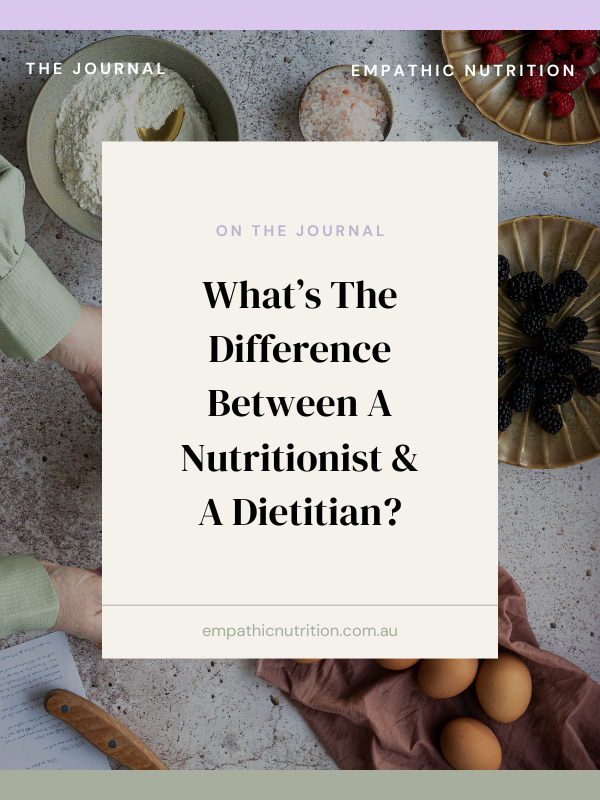What’s The Difference Between A Nutritionist And A Dietitian?
Ahhh the age-old question, and a tough one to explain. In Australia, the title of “nutritionist” is largely unregulated. Which means any man and their dog can call themselves a nutritionist essentially - even if they’ve just done a short online course at some “woo woo” natural health college, or a dodgy certification sold by a health coach.
When you’re looking to work with a nutritionist, it’s important you choose someone who has completed an extensive, well-regarded, science-based education. Look for a nutritionist with a degree in Nutrition Science or Dietetics (like me!), and don’t be afraid to ask them where they studied - trust me, it makes all the difference in informing whether someone recommends you improve your health by touching grass, versus recommending you incorporate evidence-based, effective strategies that truly work.
You can find a list of nutritionists who have a Bachelor’s degree or higher in nutrition through the Nutrition Society of Australia here. The NSA recognises reliable qualifications in nutrition, and encourages high standards of evidence-based training so consumers can recognise and consult with professionally-trained nutritionists. They’re dedicated to promoting safe and effective practice in nutrition.
To be eligible for recognition as a Registered Nutritionist (RNutr) with the NSA (again, like me!), you must have a minimum of a tertiary qualification in nutrition at an approved education institution, and/or at least three years of relevant work experience or further study.
So basically, this title means you’re working with someone who has done the time, practices in an evidence- and science-based manner, and knows their stuff!
If you go to book a consultation with a nutritionist who isn’t on this register… run!
On the other hand, dietitians in Australia are highly regulated. They must complete an Honours or Masters in Dietetics, and only a few universities offer this in Australia. Their training involves various practical placements, including time in food service and working in hospitals. Dietitians are able to work in hospital settings and treat disease, while nutritionists are not. And dietitians are also heavily regulated in what they’re allowed to recommend and practise with their patients - the regulating body continually audits them to ensure they’re sticking within the tight guidelines (many of which are developed by the Australian government!) when helping patients.
So, while dietitians have a great background of experience and knowledge, they’re limited in what they can tell you to do. Nutritionists, on the other hand, are often more holistic and can recommend a wider variety of health strategies and tools - which, on one hand, can be concerning if your nutritionist isn’t science-based (UNlike me!). But, on the other hand, it can mean you’re receiving more personalised, effective, targeted strategies from various holistic modalities, specifically designed to optimise your health.
Want to master the fundamentals of health and nutrition, and access evidence-based strategies that offer maximum benefit to your health, yet require minimal effort or time? Book a consult with me today to stop overthinking your health, and start feeling confident and empowered in your choices instead!
Hey, I’m Emily
Welcome to the Journal.
I’m a registered nutritionist, passionate about helping you live a healthy lifestyle which prioritises your physical and mental health in equal measure.





